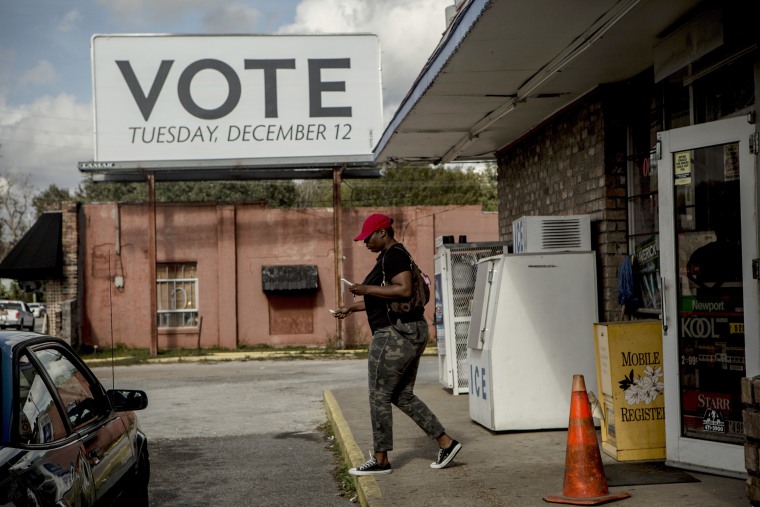BIRMINGHAM, Ala. — Sylvester Dawson will vote Tuesday in Alabama's Senate election, but he's hardly thrilled about the choices.
"Honestly speaking, I'm not that excited about either one of them," Dawson said of Democrat Doug Jones and Republican Roy Moore as he shaved a client at the barber shop he's run for 23 years in Birmingham's historic black business district.
A Jones field office sits just a few steps away, smack in the middle of a row of black barber shops and take-out joints lined up along 4th Avenue. But Dawson, who is black, said he hasn't felt compelled to step inside. "I don’t know Doug Jones," he said.
Still, Dawson will vote for him. "He's a Democrat, I'm a Democrat. And I've got to exercise my right to vote," Dawson said.
That tepid enthusiasm is widespread among African-Americans in Alabama, concerning Democratic officials and operatives who know black voters are the core of the party's base in this deeply Republican state.
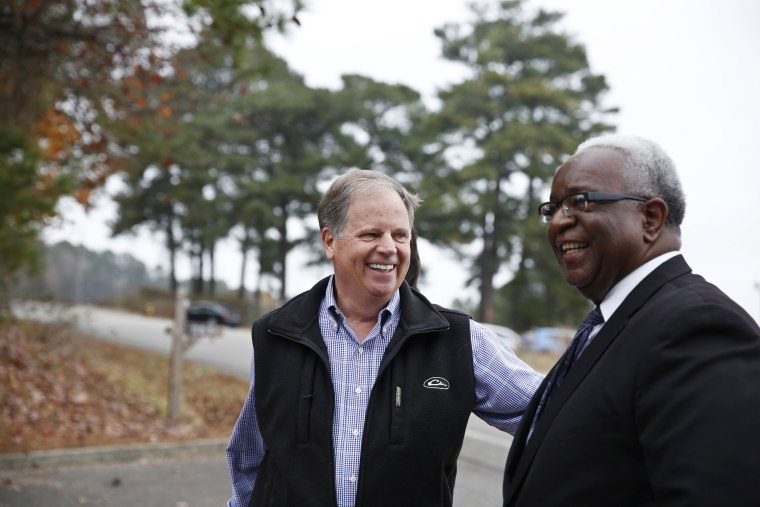
African-Americans make up about 27 percent of the state's population, and Jones will need them to turn out in droves on Tuesday, since he's expected to win just a third of whites, at best. Only 15 percent of white Alabamians voted for Barack Obama in 2012, according to exit polls, which were not conducted in the state last year.
No one thinks many African-Americans will support Moore, but there are real doubts about whether they'll vote at all.
"That's the $64,000 question," said Danny Ransom, the vice chair of the Civil Rights Activist Committee, sitting in the group’s storefront office. "There doesn't appear to be a lot of enthusiasm."
A flight of high-profile black Democrats will fan out across African-American parts of the state this weekend in a last-minute push to raise awareness of the election, a Jones campaign official confirmed to NBC News.
The surrogates include Sen. Cory Booker, D-N.J. and former Massachusetts Gov. Deval Patrick. The airlift is being organized by Rep. Terri Sewell, the only Democrat in Alabama's congressional delegation, who is also black. Rep. John Lewis, D-Ga., who led the "Bloody Sunday" march across the Edmund Pettis Bridge in Selma 52 years ago, had intended to join them but cancelled due to inclement weather.
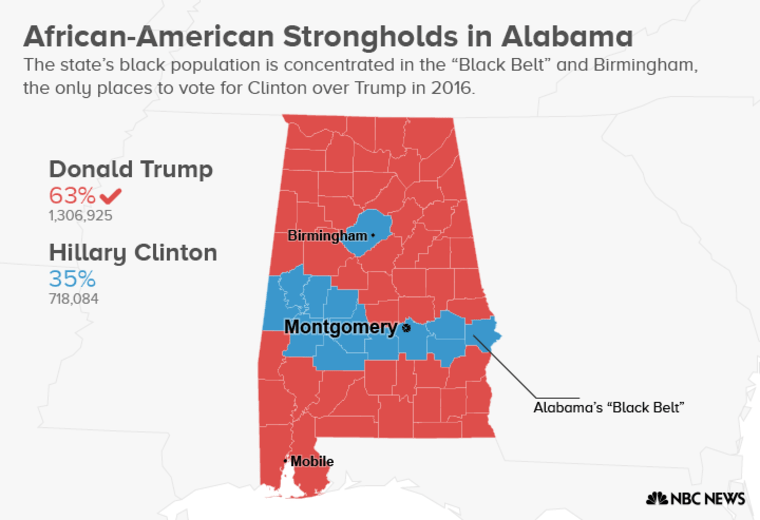
Ahead of his visit, Booker on Saturday tweeted that he would worry about the safety of Senate pages if Moore served in the chamber with him. "Your bigotry, ignorance, and hate has no place in the Senate," he added.
At the event Saturday, Booker urged Alabamians to get out and vote, saying "Democracy is not a spectator sport." He said that voters should elect a senator who will take constituent calls "not caring if they're black or they're white" or "if they're gay or they're straight."
"Bad people get elected when good people don't vote," Booker said.
Jones is trying to knit together a delicate coalition that includes both black voters and suburban white women who might be turned off by Moore, but some African-Americans have chafed at the Democrat's messaging and feel they're being taken for granted.
"It’s very difficult to appeal to white and blacks at the same time," said Artur Davis, a former Democratic congressman who was the party's gubernatorial nominee in 2010. "I’ve been there, it’s a hard thing to do."
But Davis said it's frustrating for black Democrats to so often be shouldered with the burden of getting their voters to the polls even as they're often left out of the room where decisions are made.
"If Doug Jones loses, it will not be because he didn't get enough African-American support," Davis said. "It will be because he did not get enough people of his own race, age and gender to vote for him."
In a state where almost three-in-four voters are white, the hold of partisanship has proved enduring among most white Alabamians, leaving Democrats once again turning to African-Americans for votes.
In ads and billboards across the state, Jones has highlighted his work prosecuting two KKK members in the 1963 bombing of the 16th Street Baptist Church in Birmingham, a watershed moment in the civil rights struggle.
As the U.S. attorney in Birmingham in the 1990s, Jones reopened the investigation, and became well known for it in the state's largest city, which is also almost three-quarters black.
But he's more of a mystery in other parts of the state, including the Black Belt, a stretch of heavily African-American counties that run across the middle of Alabama through Selma and Montgomery.
Younger black men in particular are a weak spot in Jones' column, according to Democrats who are studying the race, and some recent controversies haven't helped.
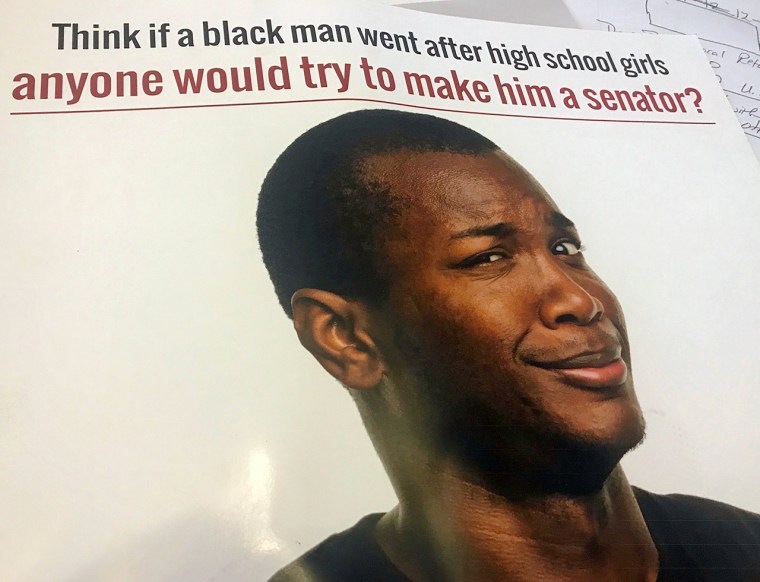
One campaign mailer in particular has lit up black social media with criticism.
It's aimed at calling attention to the allegations of sexuality impropriety against Moore, and features a photo of a skeptical looking young black man and the text, "Think if a black man went after high school girls, anyone would try to make him a senator?"
But many found it too clever by half.
To Michael Harriot, a black writer and podcast host who lives in Birmingham, the mailer was reductive and condescending. "While it might not be racist, it is certainly racist adjacent," Harriot wrote in The Root.
"Democrats treat blacks in the South like stepchildren from a previous marriage: They'll have us over for weekends and election holidays, smile and act nice, but ... they treat the new kids better. The white ones," he continued.
Criticism of the mailer swelled to a loud enough volume that Joe Madison, the host of the nationally syndicated "Black Eagle" radio show on Sirius/XM, asked Jones about it Friday.
"That mailer kind of speaks for itself," Jones said, before conceding it may have missed the mark a bit. "You know, maybe we could've used a little bit different language."
To be sure, widespread concerns about African-American turnout ahead of Virginia's gubernatorial election last month proved unfounded. Strong black turnout helped propel Democrat Ralph Northam to an easy victory.
A recent Washington Post poll found white and black voters in Alabama to be roughly equally enthusiastic about voting, though a wider margin of whites said they were paying close attention to the race — 78 percent of whites compared with 67 percent among blacks.
Jones' campaign has touted what spokesperson Sebastian Kitchen called "the largest, most active get-out-the-vote program Alabama has seen in a generation." Jones has campaigned aggressively in black churches and at historically black colleges and universities, and given multiple interviews to black media outlets.
He's also being boosted by a handful of longstanding black Democratic groups in Alabama, though it's unclear how much.
One group, for instance, has been passing out palm cards and signs that declare, "Vote or Die," and display a photo of President Donald Trump next to Obama, underscoring the salience of both men to black voters. On the back of the card, it reads, "Obama Care was saved by one vote, saving the lives of thousands of Americans. Hitler came to power with one vote, killing millions ... One Vote Matters."
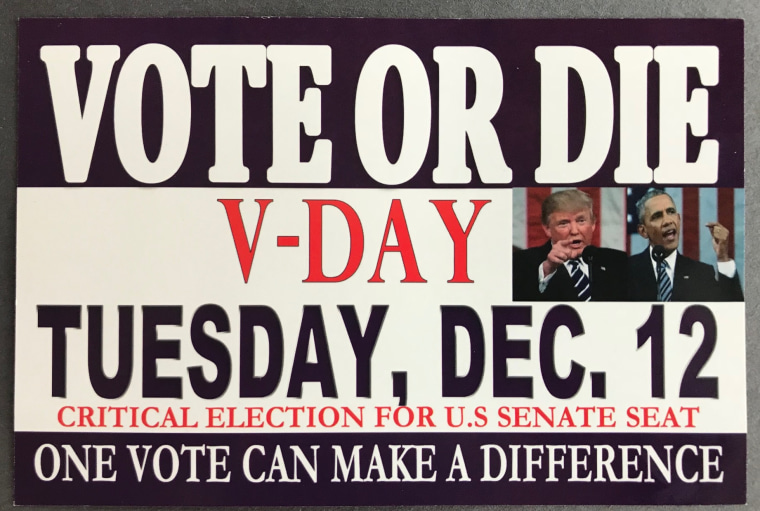
Activists are also concerned about the impact of a relatively new voter ID law.
"Disproportionately, people that don't have an ID come from the groups we care about," said Marissa McBride, the executive director of the nonpartisan Voter Participation Center, which works to boost turnout among African-Americans, Latinos, millennials and unmarried women, who together account for about 6-in-10 voters in Alabama.
Still, antipathy for Moore and Trump might be enough to push African-Americans to the polls Tuesday, regardless of how they feel about Jones.
"Is Moore going to have to register as a sex offender in D.C. and go around telling everyone if he wins?" Dawson said, provoking howls of laughter in his shop on 4th Avenue.
